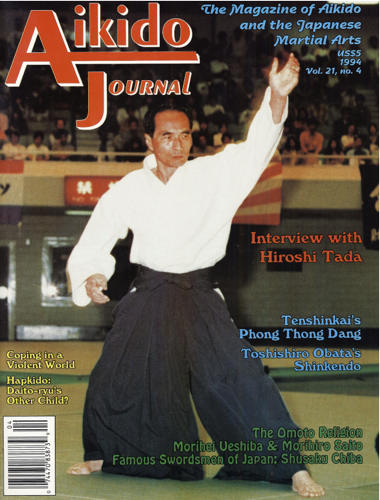
Hiroshi Tada Sensei on the cover of Aikido Journal #101
See “Interview with Hiroshi Tada” by Stanley Pranin from this issue
Ishin-denshin, the “heart-to-heart transmission”
This is the eighth and final section of the English translation of an interview in Japanese with Hiroshi Tada. You may want to read the previous sections first:
Part 1: explore Tada Sensei’s samurai ancestry and his encounters with Shotokan Karate Founder Gichin Funakoshi.
Part 2: find out how Hiroshi Tada met Shin-Shin Toitsu-Do Founder Tempu Nakamura.
Part 3: discover Tada Sensei’s thoughts on “telepathy” training.
Part 4: read Tada Sensei’s thoughts on Japanese Budo and Kata training.
Part 5: learn about the most influential person in the history of Japan, and their relationship to Japanese Budo.
Part 6: find out why Hiroshi Tada’s father was told never to read books on archery.
Part 7: discover why you should never eat watermelon after a fast.
You may also be interested in “The Day I Entered Ueshiba Dojo“, in which Hiroshi Tada recounts his first encounter with Aikido Founder Morihei Ueshiba O-Sensei.
You may notice that the tone of the interview is quite conversational. This is the way that it appears in the original Japanese – the original was not heavily edited, with the result being that the natural conversational tone was preserved. However, this also means that the discussion is sometimes less focused then a more heavily edited interview would be.
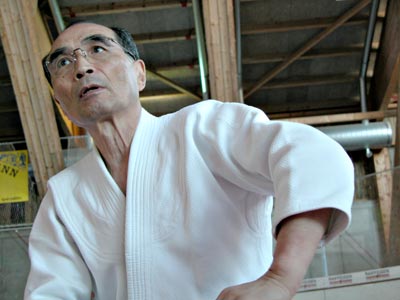
Hiroshi Tada Sensei in Switzerland
Hiroshi Tada – The Budo Body, Part 8
(English translation by Christopher Li)
Tada: At that time I weighed an average of about 70 kilos (154 pounds). At the end of the fast at home I weighed about 63 kilos (138.6 pounds), but I lost about 10 more kilos (22 pounds) after that.
Uchida: You are already quite lean, if you drop weight from there are you losing muscle?
Tada: Overall I became slimmer, however I was fine even when climbing the mountain passes.
Uchida: What kind of changes did you experience?
Tada: After I had been home for a week I started frequent morning runs. At 6 a.m. I would run from my house in Jiyugaoka up Meguro Street, and through Kaminoge to Tamagawa. After running down from the old hothouse area and across Denenchofu I would return home, exactly 15 kilometers (9 miles).
One morning I noticed that everything was incandescent. From the large trees to the grass, everything. My body moved forward through it all naturally. My legs were pumping automatically, and it felt as if I were flying through space. Even my body at that time – the skin on my face became as smooth as a baby. Not only my skin, my entire body felt clear. However, as time passed I would go right back to where I started from. (laughing)
I went to Houshuuji (宝珠寺) in May of Showa year 26 (1951). So I took time off from school to go. I thought it was something like a spring break. (laughing)
Uchida: Is it OK to skip school to go on a fast? (laughing) Concerning the feeling of clarity from that time, how did that affect your training?
Tada: When I was receiving instruction from Ueshiba Sensei, at the moment that Sensei laid a hand on me it felt as if my mind had gone blank. In other words, I understood that my condition would seem to become the same as Ueshiba Sensei’s.
Uchida: Ahh, do you mean that you would become synchronized? That your sense of self would dissappear?
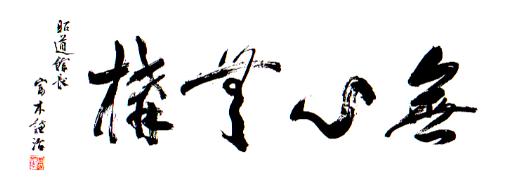
”Mushin Mugamae” (無心無構 / “No Mind, No Stance”) calligraphy by Kenji Tomiki
Tada: It must have been because Sensei was “Mushin” (無心).
Uchida: That’s incredible.
Tada: I thought that it may have been like that from before. However, I got the sense of “That’s it!” at that time. There was no feeling that Sensei’s body was separate from mine. When I spoke about this to my friends, nobody believed – that is, nobody understood at that time, but now people believe more readily.
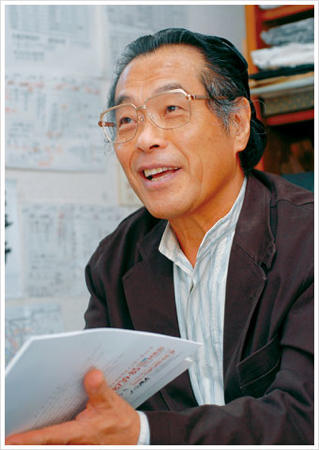
Hiroyuki Aoki, Founder of Shintaido
Aoki was at student of Hiroshi Tada’s sempai in Karate, Shigeru Egami
Shigeru Egami studied under Morihei Ueshiba’s nephew, Noriaki Inoue
Uchida: When Mr. Aoki did that they took brain wave measurements, and it seems that they were synchronized when throwing at a distance.
Tada: I believe that there have been reports that when Qigong therapists are giving treatments their patient’s brain waves become synchronized with the therapist. So, the recent generation of people believes, but until recently such stories were not usually believed.
Uchida: You don’t have any memories of that moment?
Tada: No, it’s not that I have no memories. Rather, my condition was more transparent, sharper, than usual. If that weren’t so then I would not have been able to sense that my condition had become identical to O-sensei’s. I think that the concept of a “heart-to-heart transmission” (以心伝心) may have originated with this type of event.
Uchida: Ahh, is that so. It is transmitted to your body, is that right?
Tada: If you understand nothing than it will not be any sort of training. At the moment one was thrown by Sensei there was a particularly distinctive Kokyu. Because this can be acquired directly it was of vital importance to grab Sensei’s hand and have him instruct you.
I was also told to partner with Tempu Sensei, he used me for a lot of things. I thought the same in that case. Sensei would experiment with changing various concepts, and Sensei’s body would change in an instant – you could really feel it clearly.
I fasted two more times after that. When I returned from Europe in Showa year 45 (1970) I fasted for three weeks at home. I felt like I was cleansing the grime that had attached to my spirit in Europe. The feeling that I got from this fast has become an important part of my Aikido training. This is related to control over sensations from the five senses.
What ever you are doing, there are certain insider tricks, isn’t that always the case? In important times those things come to the surface. Usually it is said in Budo that when you use it you must have wisdom. However, this is different from what is normally called wisdom. The ideal is for the body to move automatically, for the the best course of action to come forth naturally in each moment.
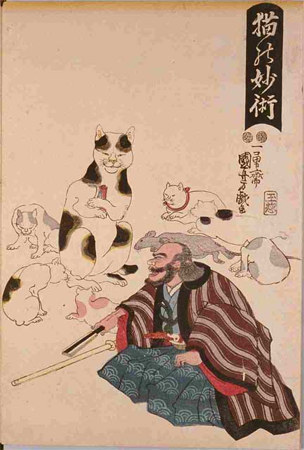
Neko no Myojutsu (“The Mysterious Technique of the Cat”) by Issai Chozan (1727)
included in “The Demon’s Sermon on the Martial Arts: And Other Tales“
… the cat replied, “Because of the self there is the foe; when there is no self there is no foe.”
In Japanese Budo it is understood that it is very important to become by doing, as in that story “The Mysterious Technique of the Cat” . Morihei Ueshiba Sensei said, “When I move technique is produced”. The way (method) of training must be designed to inculcate that into the body in this way. For example, in Kihon training for Aikido’s ushiro techniques, people are often told to put their hands on the floor. The reason why you put your hands on the floor is not to pull your partner and unbalance them, you put your hands down in order to lower yourself, and your partner naturally becomes unbalanced. In that way, through the arrangement of your body, your body remembers the sensation of technique being applied in a natural manner. You must not engage in a conflict with your partner when applying technique. This training is the goal of Kata training. According to each person’s limits this practice is performed a hundred times, a thousand times, ten-thousand times, your body must begin moving automatically. When you do this your spirit at that time will become Dharana (concentrated) and Dhyana (unified), meditation in Western terms, in Japan this is called Zen (however, we call it Anjo Daza). The five senses are activated to their greatest limits, but are not led astray by those sensations. When you achieve this state, and movement comes forth naturally, then Waza (technique) will be created.
I think that grasping that as a starting point is the greatest advantage of fasting. Another, that I mentioned before, is that even when there is no food you will have no problems in your thoughts. This really happened to me! At the time that Aikido began in Italy there were no students, so there was a period of time when I only ate one slice of bread a day, but it was no problem at all. (laughing)
Uchida: Have any of your current students experienced fasting?
Tada: When Kenji Hayashi (林賢二), who is now practicing in Germany, was training at Gessouji he did one week fasts several times. He also continued training in Aikido as usual. Yoshinobu Irie (入江嘉信) also fasts occasionally. However, I don’t recommend that anybody force themselves to do it. Even though I do think that it’s good for my body. Because if you’re not careful it can be dangerous. You should have a good instructor and a quiet Dojo in which to do it. I think that a place in the mountains is better than a place by the ocean. That’s because when you do it at home your family eats. Personally, I am fine if someone is eating in front of me, but my family feels uncomfortable while they are eating…The most important thing is not to give up part way through once you have decided upon the number of days to fast. When you give up you carry around an immense feeling of failure on your spirit, and that’s not good for you.
Uchida: You first started after meeting Ava Nakamura at Yukikazu Sakurazawa’s (桜沢如一) place. She fasted for thirty days in Tateyama, met a sage, and then became a sage herself. On that day she understood all that would occur during the day, and what people were thinking…
Tada: Right, right, that’s true. I thought “I’d like to be the same”. (laughing)
Uchida: You really like that kind of thing, don’t you? (laughing)
Tada: In any case, my father would say, “Hiroshi always believes anything anybody says”. (explosion of laughter)
Uchida: When you were told by the Yokoyama brothers that they had something interesting to show you…
Tada: When I was told, “There’s a teacher like this over there” I would go right away. I went straight to the Ichikukai Dojo.
Uchida: Without hesitation. In a manner of speaking, doesn’t that mean that your instincts are very good? When making a choice. Since you went directly to Morihei Ueshiba Sensei and Tempu Nakamura Sensei without hesitating. Directly there. Before that, Gichin Funakoshi Sensei. In any case, without any unnecessary action or detours…doesn’t that mean that your instincts are really very good?
Tada: I was very grateful for those points.
However, it’s not a matter of my instincts being good. In any case, if at all times you strive to train with all your effort, and keep that wish deep in your heart (at times it is only later on, when it becomes expressed on the outside of your spirit, that you yourself realize this), it is only a matter of course that you will achieve that end and that your senses will become sharpened. When you do this it will be as if a thread appears before your eyes linking you to people and things that are essential to your goals. Said another way, when you do all that is humanly possible a faintly glimmering path is revealed, with a new world beyond…It’s that kind of thing. Leave that kind of thing to the gods, perhaps this would be called Karma in Buddhism.
Uchida: Even now, you don’t eat meat, is that right?
Tada: I don’t eat meat. I eat fish that can be eaten whole with the bones, and a little chicken, and I eat brown rice.
Uchida: But you don’t speak much about this to your students, do you? About dietary restrictions.
Tada: It’s good to eat a lot of vegetables. Maybe if I reach my nineties I’ll start explaining a little about health methods too. I can’t talk about health methods unless I’ve lived that long. (laughing)
Tempu Sensei was the same way. Certainly, it was after he turned eighty that he started explaining health methods, he never said anything before that. Shin-shin Toitsu-ho is the use of the power of life, I wasn’t really told that it was anything like a health method.
Uchida: Now that you mention it, you never say, “Aikido is good for your health”, do you? So, health methods after you turn ninety? (laughing) It’s still a long way away, but I’m looking forward to it. It’s already been about two hours, so I’d like to finish up the interview here. Sensei, thank you for taking such a long time to speak with me today.
[End of the interview]
(afterward by Tatsuru Uchida)
When the Department of Intercultural Studies decided to publish the paper “Eastern Body – Western Body” (東洋の身体・西洋の身体), the first thing that I thought of was a long interview with Hiroshi Tada Sensei called “The Budo Body” (武道的身体).
As stated in the interview, Tada Sensei has not yet published the comprehensive Aikido book that so many have wished for. I believe that this interview with Hiroshi Tada Sensei, the successor to the ideals and technical methods transmitted by Morihei Ueshiba and Tempu Nakamura, is a precious resource not only for his students, but for all those with a scholarly interest in Budo.
The interview was conducted in the Gessouji Dojo (月窓寺道場) in Kichijoji, Musashino-shi, and the transcription of the original taped interview was approved by Tada Sensei. Further, small errors in names or facts that occurred during the interview were noted by Sensei himself. For that reason, although it is an interview, in terms of the accuracy of the data the quality is the same as if Sensei had written it himself.
Sensei occasionally spoke rather quickly, and there were some portions of the tape that could not be made out, so Sensei deleted two or three sections, saying, “A normal person reading this would not understand what the conversation was about”. Obviously, that does not reduce the value of the data. Further, some students may receive the impression that Sensei’s manner of speech is overly correct, in actuality Sensei slightly altered some of his own wording.
There is no way that I can thank Tada Sensei for his detailed corrections in addition to his cooperation during this lengthy interview. Along with my most profound gratitude, I would like to make recompense for this great debt through my own efforts to disseminate Aikido in the future.
This interview appeared in “Eastern Body – Western Body” (Toyou no Shintai – Seiyou no Shintai / 東洋の身体・西洋の身体), a joint paper from 1994 by the Kobe College Department of Intercultural Studies (神戸女学院大学総合文化学科) – edited by Naoyuki Murakami (村上直之), Mitsuru Watanabe (渡部充) and Tatsuru Uchida (内田樹) – published in April 1995.
Christopher Li – Honolulu, HI

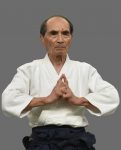
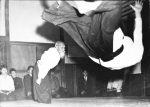


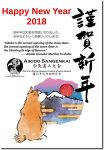
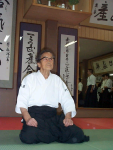
Leave a Reply